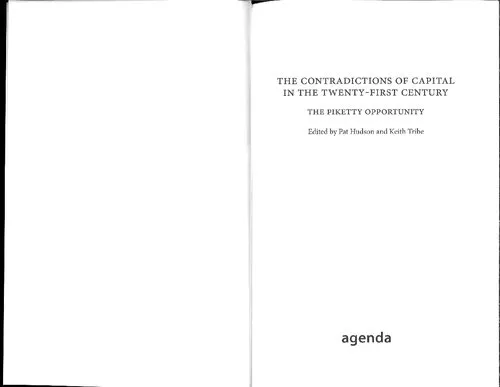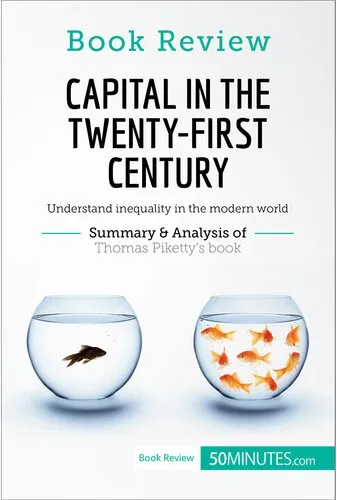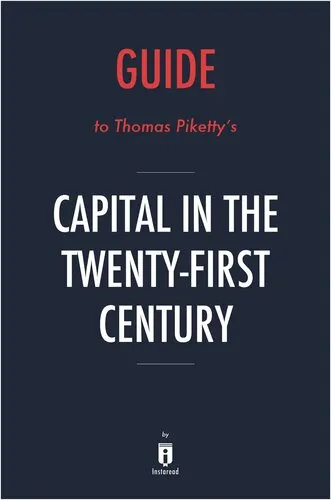The contradictions of capital in the twenty-first century (-ch 1 to 4 only-)
4.0
Reviews from our users

You Can Ask your questions from this book's AI after Login
Each download or ask from book AI costs 2 points. To earn more free points, please visit the Points Guide Page and complete some valuable actions.Related Refrences:
Welcome to the critical exploration of economic paradigms in "The Contradictions of Capital in the Twenty-First Century." Authored by Pat Hudson and Keith Tribe, this scholarly work delves into the intricate dynamics of capital and capitalism, dissecting the societal and economic implications that have manifested in recent years. This book serves as a vital resource for those seeking a deeper understanding of economic inequality and the transformative power of capitalism in the modern era.
Detailed Summary of the Book
"The Contradictions of Capital in the Twenty-First Century" embarks on a comprehensive journey through the complex landscape of contemporary capitalism. Across the first four chapters, Hudson and Tribe critically analyze the economic theories and practical realities that shape today's economies. The book revisits and scrutinizes the propositions established by Thomas Piketty in "Capital in the Twenty-First Century," offering nuanced perspectives and identifying areas of contradiction within his arguments.
The authors start by addressing foundational concepts of capital, distinguishing between different types of wealth and their implications on economic disparity. They argue that the historical progression of capitalism has fostered an environment where economic inequality is perpetuated, challenging the notion that market forces alone can ensure equitable distribution of resources.
Moving forward, the discussion deepens with an analysis of wealth concentration and the critical role played by institutions and state policies. Through detailed examination, Hudson and Tribe illuminate how legislative frameworks and societal norms reinforce existing power structures, despite the theoretical promises of capitalism to foster inclusivity and growth.
The concluding chapters underscore the importance of revisiting historical economic narratives, urging a recalibration of current economic models to address modern challenges. The authors propose critical reflections on how past experiences with capitalism can inform strategies to mitigate its inherent disparities.
Key Takeaways
- Capitalism, as a dynamic yet flawed economic system, has inherent contradictions that need scrutiny and reform.
- Historical context is crucial in understanding and addressing current economic disparities.
- Policy and institutional interventions are essential to counteract the imbalances created by the concentration of wealth.
- Re-evaluating economic narratives can lead to a more informed approach to addressing inequality.
Famous Quotes from the Book
"Economic inequality is not a transient phase of capitalism; it is a defining characteristic that requires deliberate counteraction."
"Understanding the past is essential to navigate the economic complexities of the present and future."
"Capital in the twenty-first century is not merely an accumulation of wealth; it is an indicator of power and influence."
Why This Book Matters
"The Contradictions of Capital in the Twenty-First Century" is an essential contribution to economic discourse, offering a critical examination of capitalism in the context of growing global inequality. The book is particularly relevant for policymakers, economists, and scholars who are grappling with the challenges of contemporary economic systems. By providing a thorough analysis of the dynamics of capital, Hudson and Tribe offer a framework for understanding and addressing the structural issues that plague modern economies.
In a world where economic disparity continues to widen, this work challenges readers to question prevailing economic doctrines and to seek more equitable solutions. It serves as both a critique and a call to action, urging a reconsideration of economic structures and advocating for informed, strategic reforms.
Free Direct Download
You Can Download this book after Login
Accessing books through legal platforms and public libraries not only supports the rights of authors and publishers but also contributes to the sustainability of reading culture. Before downloading, please take a moment to consider these options.
Find this book on other platforms:
WorldCat helps you find books in libraries worldwide.
See ratings, reviews, and discussions on Goodreads.
Find and buy rare or used books on AbeBooks.
1333
بازدید4.0
امتیاز50
نظر98%
رضایتReviews:
4.0
Based on 0 users review
"کیفیت چاپ عالی بود، خیلی راضیام"
Questions & Answers
Ask questions about this book or help others by answering
No questions yet. Be the first to ask!





